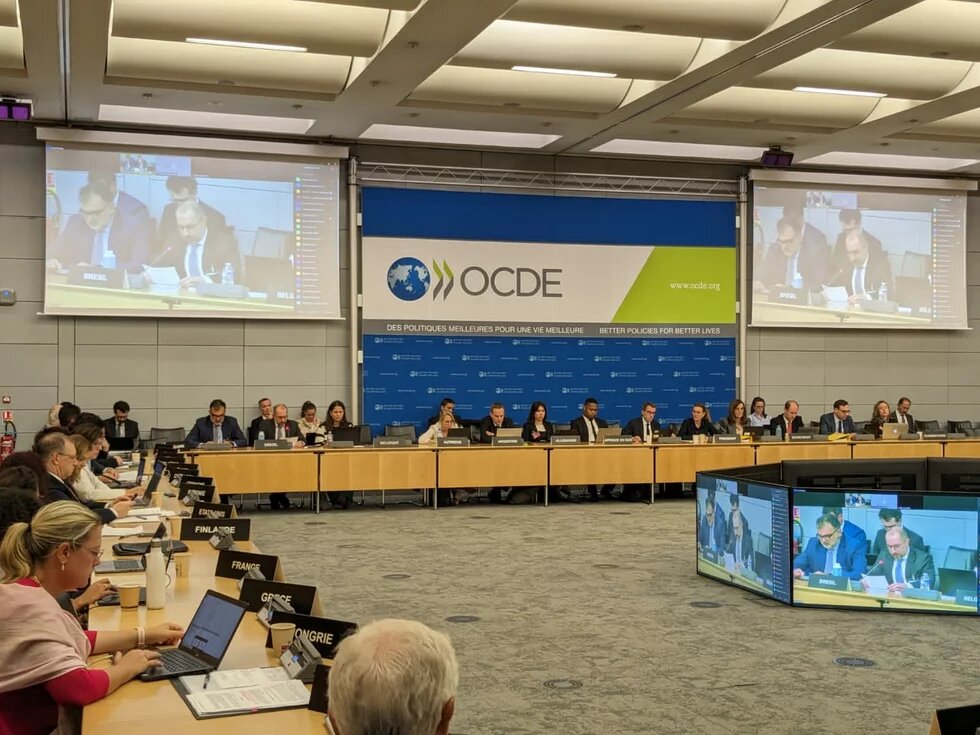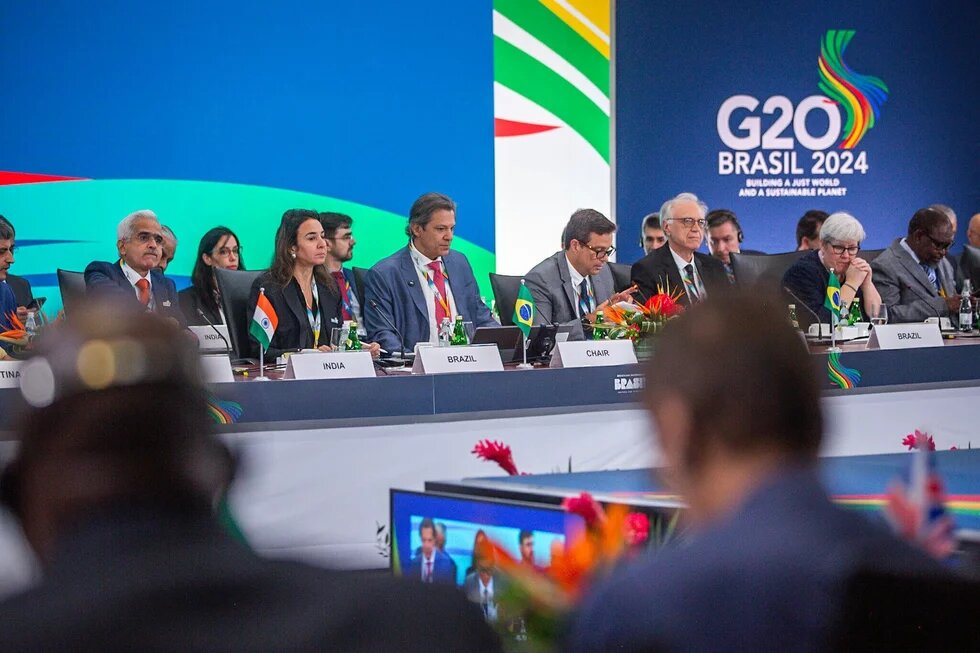
With the motto “Building a Just World and a Sustainable Planet”, Brazil took over the presidency of the G20 in 2024, establishing three priority axes: the fight against hunger, poverty and inequality; the three dimensions of sustainable development (economic, social and environmental); and the reform of international governance.

The context is challenging: the G20 arrives in Brazil at a time of crisis of hegemony on the international stage. The world is facing wars, economic disputes and a climate and social emergency. In addition, there is a profound crisis of values, marked by the rise of extreme right-wing forces, which question the principles established in the post-World War II period, such as human rights, multilateralism and international cooperation. Currently, both the US and China are finding it difficult to mediate conflicts and lead the world towards peace. Brazil is therefore assuming the presidency of the group that represents the world's largest economies in a period characterized as a “hegemonic transition”, whose tensions and uncertainties are reflected in the group's internal dynamics.
In order to identify issues that could generate consensus amid the current challenging scenario, the G20 Finance Track in Brazil presented a bold proposal that has been gaining increasing support: the creation of an international standard to ensure taxation of ultra-high net worth individuals (“super-rich”). According to a report commissioned by the Brazilian government and presented in negotiations with G20 members, individuals with assets in excess of US$ 1 billion (including assets, real estate, shares, stakes in companies, among others) would be obliged to pay a minimum annual tax of 2% on the total value of their wealth. The choice to tax wealth, rather than income, is due to the greater difficulty of handling assets compared to income. The rule would be implemented flexibly by the participating countries, which would adapt the measure to their national legislation.
It is estimated that this minimum tax of 2% on billionaires could generate annual revenue of between 200 and 250 billion dollars from around 3,000 individuals, contributing to the financing of public goods and services and investments in tackling the climate crisis (Ibidem).
This proposal is in addition to the agreement already established by the OECD, promoted within the framework of the G20, on Base Erosion and Profit Shifting (BEPS). The aim of the agreement is to ensure that multinationals are taxed at a minimum rate of 15% on their global profits. In 2016, the OECD and the G20 created an “Inclusive Framework” for BEPS, allowing countries interested in cooperating to join the agreement, which initially brought together 100 nations. In 2021, the rules were simplified to facilitate implementation. According to the OECD, more than 140 countries have already committed to adopting 15 measures to combat tax evasion. These measures aim to equip governments with tools to ensure that profits are taxed where the economic activity takes place, as well as addressing the challenges posed by the digitalization of the economy and reducing disputes over the application of international tax rules.
Although the OECD/G20 agreement is widely regarded as a significant step forward in the attempt to correct distortions and combat tax evasion, its rules are complex and enforcement faces major challenges. Critics argue that the agreement has not been effective enough, especially since multinationals end up not paying the minimum tax in developing countries. In light of this, the proposal for a minimum tax on high net worth individuals has gained increasing support from non-governmental organizations, activist networks, influential personalities and countries such as France, South Africa, Germany and Spain.
The positions of social actors and (non-)progress in the Finance Track
The proposal has generated intense debate and positions. We can highlight here the perspective of civil society organizations, which presented their recommendations to the Finance Track in May 2024, and think tanks and research centers involved in the T20 (Think20), which submitted their recommendations to the G20 in July 2024.
The first central point of the debate concerns the most appropriate international space to discuss tax cooperation. Non-governmental organizations and think tanks agree that the G20 should support the creation and implementation of the United Nations Framework Convention on International Tax Cooperation (UNFCITC). For these actors, the UN, and not the OECD or the G20, represents the fairest, most inclusive and democratic forum, capable of giving a voice to the poorest countries.
Thus, there is a consensus among non-governmental organizations and think tanks that it is within the framework of the UNFCITC (United Nations Framework Convention on International Tax Cooperation) that the creation of a global minimum tax on high net worth individuals should be negotiated and implemented, ensuring that the resources collected are directed towards the promotion of human rights, especially in the impoverished countries of the Global South.
For the T20, the UNFCITC needs to address global tax challenges, with an emphasis on the taxation of international transactions, with a view to making tax rules fairer and simpler. G20 members should step up efforts to exchange information and improve tax transparency, especially through detailed country-by-country public reporting. It is essential to move forward with the implementation of mechanisms for sharing information on different asset classes and the creation of a public Global Asset Registry, under the supervision of the UNFCITC.
In addition, the resources raised by these mechanisms, as well as those from redirecting fossil fuel subsidies, should be used to strengthen redistributive policies, improve universal social protection systems, generate decent jobs and support climate change adaptation and mitigation initiatives, with a special focus on developing economies.
Civil society organizations and networks, for their part, argue that tax negotiations should incorporate human rights, as well as socio-environmental and climate obligations, as guiding principles for decisions. In addition, they emphasize the need to decolonize tax standards, adopting an intersectional approach to gender and race/ethnicity in tax policies to combat inequalities.
Unfortunately, these recommendations are still far from the G20 Finance Track negotiations. However, some progress was made at the technical meeting in July, which resulted in a preliminary document that will be presented in the final declaration of the heads of state in November this year. The finance ministers' resolution document recognizes that progressive taxation is one of the main tools for reducing inequalities, strengthening fiscal sustainability, facilitating budget consolidation and promoting inclusive growth, as well as contributing to the achievement of the Sustainable Development Goals.
At the same time, it was reaffirmed that taxation is a right inherent to the sovereignty of states. International tax cooperation, which is inclusive and consensus-oriented, should only aim to strengthen the capacity of jurisdictions to exercise their tax rights more effectively.
In the view of the Finance Track, the OECD/G20 Inclusive Framework on BEPS demonstrated the potential of international tax cooperation, with G20 countries reaffirming their commitment to quickly conclude and implement the Two Pillar Solution. This solution seeks to stabilize the global tax landscape, reduce profit shifting and restrict harmful tax competition, limiting the trend of a “race to the bottom” in corporate tax rates. The document also highlights that the implementation of the Automatic Exchange of Financial Information in Tax Matters (AEOI) on financial accounts represents a historic milestone in promoting tax transparency, making financial secrecy more difficult, combating offshore tax evasion and strengthening tax enforcement.
Within the framework of the UNFCITC, the negotiations represent an additional opportunity to foster inclusive and effective international tax cooperation. However, for the negotiators, it would be essential to avoid “unnecessary duplication of efforts”, building on the achievements and processes already established, as well as the ongoing work of other international organizations, such as the OECD. UN member states are expected to engage in the discussions in a spirit of cooperation, considering the aspirations of both developing and developed countries, in order to strengthen global tax cooperation.
In other words, while the T20 and civil society organizations advocate prioritizing the poorest and developing countries, historically affected by unfair tax policies, the Finance Track negotiators reiterate the need for a consensus that, in practice, tends to reflect the positions of the rich countries. It is relevant to recall the observation made by a T20 expert during a debate on international taxation, in response to an OECD representative: “consensus is, in this case, undemocratic, as it does not represent the interests of the majority of the world's population and countries.”
The Financial Track document also recognizes that the international mobility of high net worth individuals poses significant challenges to guaranteeing adequate levels of taxation, which compromises the progressivity of the tax system. In this context, the text states that, out of respect for tax sovereignty, the G20 countries will engage in cooperative engagement to ensure that ultra-high net worth individuals are effectively taxed. This collaboration could involve the exchange of best practices, the promotion of dialogues on tax principles and the creation of mechanisms to combat tax evasion.
What lies ahead?
The consensus reached so far in the G20 Finance Track remains limited and insufficient. However, the formulations presented in the document show that the G20 finance ministers and central bank presidents recognize two main demands coming from low-income countries, as well as from the broad spectrum of civil society and think tanks: the implementation of the UN Framework Convention on International Tax Cooperation and the proposal to tax ultra-high net worth individuals.
Parallel to the G20, a significant breakthrough occurred at the United Nations: in September 2024, the Ad Hoc Committee approved the Terms of Reference (ToR) of the UNFCITC, which will now be submitted to the General Assembly for approval by the end of the year. According to Grondona et al. (2024), the session of the intergovernmental negotiating committee is scheduled to take place by February 2025. At that time, the committee should present the final text of the UNFCITC and its first two protocols to the General Assembly for consideration at the 82nd session.
Of the two protocols, the first topic has already been defined and concerns cross-border services. The second theme, however, still needs to be decided from a list that includes the proposal to “address tax evasion and avoidance by high net worth individuals and ensure their effective taxation in the relevant Member States”. It is therefore essential to step up pressure from civil society, think tanks and other relevant stakeholders to ensure that countries support this choice as the second protocol.
Regarding the G20, the November summit in Rio de Janeiro is unlikely to make significant progress beyond the results achieved in July. The proposal to tax the super-rich is still new and has only just been officially presented to the group. This proposal needs to be matured and negotiated, especially in order to obtain the support of the main world leaders, such as the United States and China. Therefore, we shouldn't expect any concrete decisions in this regard during the Rio summit. However, the idea has been introduced, discussions are underway, and Brazil stands out as the country that took this proposal to the G20.
It will now be up to South Africa, which will take over the presidency of the G20 in 2025, to continue the negotiations and strive to increase support for the proposal. For an African country facing one of the highest rates of inequality in the world, this agenda is fundamental and must be integrated with efforts to alleviate foreign debt. In this context, negotiations within the UN and the G20 are taking place in parallel, but in an articulated manner, expanding the spaces for pressure and negotiation in favor of the approval of a new coordinated international standard that ensures the taxation of high net worth individuals. Social mobilization, involving broad segments of society, will be crucial to strengthening this process.
